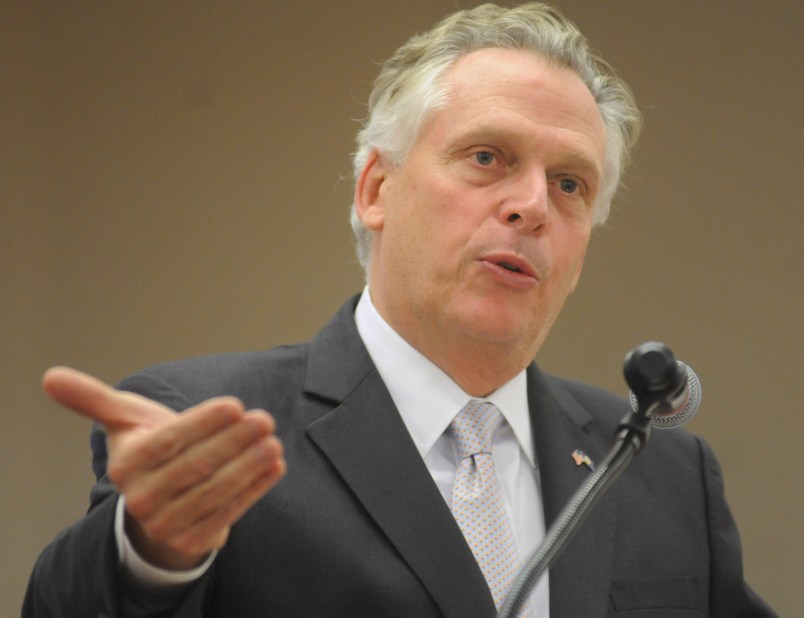RICHMOND, Va. (AP) — Virginia Gov. Terry McAuliffe on Thursday called off a man’s execution in a 2006 murder-for-hire case, citing concerns about false information provided to jurors that he believes influenced their decision to sentence him to death.
Ivan Teleguz was scheduled to be executed Tuesday, but McAuliffe commuted his sentence to life in prison without the possibility of parole.
It’s the first execution that the Democratic governor has stopped since taking office. McAuliffe is a Catholic who has said he’s personally opposed to capital punishment, but will uphold the law as governor.
Teleguz was convicted in 2006 of hiring a man to kill 20-year-old Stephanie Sipe, the mother of his child. Sipe was stabbed to death in her Harrisonburg apartment. Sipe’s mother found her body two days later, along with their 2-year-old son, who was unharmed.
McAuliffe said he believes Teleguz is guilty despite questions raised by attorneys and others after two witnesses recanted their testimony implicating him in the crime.
But McAuliffe said he would spare Teleguz’s life because the jury was told that the man was involved in another murder in Pennsylvania, which never happened. During the trial, it was also suggested that Teleguz was involved with the “Russian Mafia,” but there’s no evidence to support that, McAuliffe said.
McAuliffe said he believes that information made jurors fearful for their safety, noting that they asked the judge whether Teleguz had access to their personal information and addresses.
“To allow a sentence to stand based on false information and speculation is a violation of the very principles of justice our system holds dear,” McAuliffe said.
Teleguz’s attorneys applauded McAuliffe’s decision in a statement, and said the man will continue to fight to clear his name.
“Governor McAuliffe correctly recognized that our system of justice cannot stand by and allow an execution to proceed when jurors were told to impose a death sentence based on false information,” attorneys Elizabeth Peiffer and Michael Williams said in a statement.
Marsha Garst, the lead prosecutor in the case, did not immediately return an email seeking comment.
The governor had faced mounting pressure to intervene after religious leaders, death penalty opponents and the newspaper in Virginia’s capital city raised concerns about executing a possibly innocent man.
Since Teleguz went to death row, two men who implicated him have said they lied under pressure from investigators they claim were fixated on putting Teleguz away.
Kevin Whitfield, the lead police investigator in the case, said in a recent interview with The Associated Press that he has never wavered from his belief that Teleguz is guilty. Sipe’s sister has also said her family still believes Teleguz is responsible.
“I do not have any doubt,” Whitfield said. “I feel as convinced as today as I did back then.”
After the two prosecution witnesses recanted their trial testimony in written affidavits, the 4th U.S. Circuit Court of Appeals ordered a judge to conduct a hearing on Teleguz’s innocence claim.
But the judge rejected Teleguz’s bid after one of the witnesses, Edwin Gilkes, refused to testify and another — who had been deported to Kyrgyzstan — didn’t show up. Michael Hetrick, whose DNA was found at the scene, again testified that Teleguz hired him and Gilkes to kill Sipe.
Teleguz’s attorneys and supporters say that to save his own life, Hetrick told investigators what they wanted to hear.
Teleguz’s family came to the U.S. when he was a child to escape religious persecution in Ukraine, when it was controlled by the Soviet Union. He’s is deeply religious and spends most of his time in prison doing Bible studies, his attorneys said.
McAuliffe has overseen two executions since he took office in 2014. Convicted serial killer Alfredo Prieto was given a lethal injection in October 2015. Ricky Gray, who killed a well-known Richmond family of four, was executed in January.
Eight death row prisoners in Virginia have been granted clemency since the U.S. Supreme Court reinstated the death penalty in 1976, according to the Death Penalty Information Center. The last Virginia governor to spare a condemned man was Gov. Tim Kaine, when he commuted convicted murder Percy Walton’s sentence to life in prison in 2008.
The governor’s decision in Teleguz’s case comes as an aggressive effort in Arkansas to conduct that state’s first executions since 2005 stalled for a second time this week when courts blocked lethal injections. Pharmaceuticals companies and other suppliers have objected to their drugs being used in executions and have been trying to stop states from getting supplies for lethal injections.
____
Follow Alanna Durkin Richer at http://twitter.com/aedurkinricher. Read more of her work at http://apne.ws/2hIhzDb
Copyright 2017 The Associated Press. All rights reserved. This material may not be published, broadcast, rewritten or redistributed.






